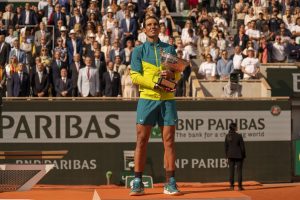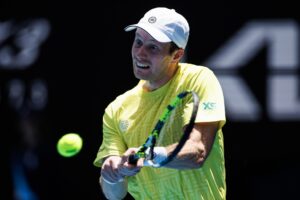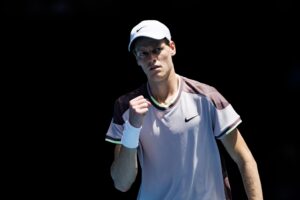Injury is the cruellest blow any sportsperson can suffer. Worse even than the most one-sided of defeats. Then, at least, there are lessons to be learned, a desire for vengeance to be stoked, a bar to be met and then overcome. But when it is a players own body that lets them down, there is little to be done. They are denied even the cold comfort that there is always next week. Instead, they are left to face the dreary reality of rehabilitation, far from the bright lights and the heat of battle.
It is a blow even harder to bear for those competing in individual sports such as tennis. Without even the chance to be the part of a greater whole, to will comrades on to victory from the sidelines, the tennis player can do nothing but watch and wait for their chance to return to action. It is little wonder then that so many have hurried their returns from serious injuries to the detriment of their recovery.
Novak Djokovic, once the unchallenged ruler of Melbourne Park, stumbling to a fourth-round exit, with a broken down elbow heavily bandaged, springs to mind. So does watching a weary Rafael Nadal trudge off what was once his Court Philippe Chatrier in 2015 after a 5-7 3-6 1-6 hammering at the hands of Djokovic. Both men looked like shadows of the great champions they had once been. Yet eventually Djokovic and Nadal were both able to recapture their former glories, and then some.
But Juan Martin del Potro is a player who knows the frustration of injury and has, from bitter experience, learned the value of patience better than any. In 2009, unheralded and almost unknown, he brought the duopoly of Rafael Nadal and Roger Federer crashing down under the lights in New York to claim his first Grand Slam title. Going into the 2010 season, he seemed poised to launch a challenge for the highest honours in the sport and possibly even the #1 ranking.
Instead, the tendon in his right wrist frayed, the strain of producing such thunderous power making demands of his body that it could not meet. Therapy and rest had no effect and del Potro was forced under the knife. Doing so ended his 2010 season, snatching away the chance to defend his US Open title. By the year’s end, his ranking had plummeted to outside the top 250 and his triumphs had been lost in the shadow of fresh glories for Nadal and Federer.
He returned to action in 2011, putting together a phenomenal season that saw him climb from 485th in the world rankings, after his second-round defeat at the Australian Open, to world #11 at the year’s conclusion. He won titles in Delray Beach and Estoril, as well as reaching the semifinals in Indian Wells and the fourth round at Wimbledon. But the focus of the world was elsewhere. It was Djokovic, winner of three Grand Slams and newly crowned #1, who claimed the headlines.
Undeterred, del Potro kept working his way back towards the top of the mountain, his easy-going persona hiding an indefatigable resolve to succeed. 2012 saw his return to the top ten and a memorable run to the bronze medal at the London Olympics. 2013 brought runner-up finishes in Indian Wells and at the Shanghai Masters, as well as a semifinal showing at Wimbledon, where he narrowly lost an instant classic to Djokovic. The Argentine was back and another shot at a Grand Slam title looked to be on the cards.
Until his left wrist broke down. It was an injury more serious still than the one he had suffered in 2010, severe enough to threaten his career. Del Potro’s mood understandably darkened and thoughts of retirement were prominent. In his absence, taking advantage of an indifferent year by the standards of the big four, Stan Wawrinka and Marin Cilic broke through to win in Melbourne and New York respectively and join the ranks of the Grand Slam champions.
Still, del Potro refused to despair. And despite being effectively robbed of his two-handed backhand by his wrist injury, del Potro clawed his way back on to tour again. Nor was he content to simply go through the motions, living on the goodwill earned by former glories. He had been a champion once, and he would be so again, even if by force of will alone. The first signs of life came at the Rio Olympics where he engineered a thrilling run to the gold medal match, beating Djokovic and Nadal to get there.
He was virtually spent by the time he stepped on court to face Andy Murray in that match and the Scot knew it. He pulled del Potro from pillar to post and despite a valiant effort from the Argentine, he could not overcome the defending gold medallist, who claimed an ultimately deserved 7-5 4-6 6-2 7-5 victory. But in New York weeks later, del Potro would again capture hearts and minds with a thrilling run to the quarterfinals, where it took the best of eventual champion Stan Wawrinka to stop him.
He would deliver another memorable run in 2017, knocking out reigning Australian Open and Wimbledon champion Roger Federer in the quarterfinals, only to fall just short against Nadal in the last four. Then, in 2018, despite a disappointingly early exit at the Australian Open, del Potro roared again. He stormed to titles in Acapulco and Indian Wells, as well as reaching the last four in Paris, the quarterfinals at Wimbledon and finishing as runner-up at the US Open.
Once again del Potro stood on the cusp of a breakthrough. And once again, he was denied. At the Shanghai Masters, he slipped and fell heavily, fracturing his knee cap. In an instant, his season was over, denying him his long awaited return to the ATP Finals. That same knee injury forced him out of the Australian Open and now has prevented him from defending his Indian Wells title. Another moment that might have stood amongst the proudest of his career stolen away.
And yet, if we can trust in one thing, it is that del Potro will be back. Perhaps not stronger than ever, for his body has now taken an almighty beating over the past decade, but back all the same. With the same undimmed will to succeed, to overcome the challenges placed before him and take his place amongst the game’s elite. For del Potro, and for the tennis world at large which so badly misses him in his absence, one supposes that will have to be enough.
But it might have been so much more.
Main photo:
Embed from Getty Images






